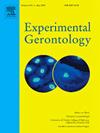A formula for calculating 30-item Geriatric Depression Scale (GDS-30) scores from the 15-item version (GDS-15)
IF 4.3
3区 医学
Q2 GERIATRICS & GERONTOLOGY
引用次数: 1
Abstract
The Geriatric Depression Scale with 30 items (GDS-30) and with 15 items (GDS-15) are both valid tools for assessing depression in older adults, but their absolute values are not directly comparable. Here, we used a dataset (n=431) with GDS-30 scores from a project concerning fall-risk assessment in older adults (FARAO) to develop and validate a formula which can be used to convert GDS-15 scores into GDS-30 scores. We found that the GDS-15 score cannot simply be multiplied by 2 to obtain the GDS-30 scores and that estimations of GDS-30 from GDS-15 are not affected by age, sex and MMSE. Therefore, the optimal formula to estimate the GDS-30 score from the GDS-15 score was: GDS-30_estimated = 1.57 + 1.95 × GDS-15. This formula yielded an estimate of GDS-30 with an explained variance of 79%, compared to 63% when GDS-15 was simply multiplied by 2. Researchers that have used the GDS-15 and want to compare their outcomes to other studies that reported only the GDS-30 are advised to use this formula.从15项版本(GDS-15)中计算30项老年抑郁量表(GDS-30)得分的公式
老年抑郁量表30项(GDS-30)和15项(GDS-15)都是评估老年人抑郁的有效工具,但它们的绝对值没有直接可比性。在这里,我们使用来自老年人跌倒风险评估项目(FARAO)的GDS-30评分数据集(n=431)来开发和验证一个公式,该公式可用于将GDS-15评分转换为GDS-30评分。我们发现GDS-15分数不能简单地乘以2得到GDS-30分数,并且GDS-15的GDS-30估计值不受年龄、性别和MMSE的影响。因此,由GDS-15评分估算GDS-30评分的最优公式为:GDS-30_estimated = 1.57 + 1.95 × GDS-15。这个公式得出的GDS-30的可解释方差估计为79%,而GDS-15简单乘以2时的可解释方差为63%。使用GDS-15并希望将其结果与仅报告GDS-30的其他研究结果进行比较的研究人员建议使用该公式。
本文章由计算机程序翻译,如有差异,请以英文原文为准。
求助全文
约1分钟内获得全文
求助全文
来源期刊

Experimental Gerontology
医学-老年医学
CiteScore
7.30
自引率
2.60%
发文量
280
审稿时长
1 months
期刊介绍:
Experimental Gerontology is a multidisciplinary journal for the publication of work from all areas of biogerontology, with an emphasis on studies focused at the systems level of investigation, such as whole organisms (e.g. invertebrate genetic models), immune, endocrine and cellular systems, as well as whole population studies (e.g. epidemiology).
The journal also publishes studies into the behavioural and cognitive consequences of aging, where a clear biological causal link is implicated. Studies aimed at bridging the gap between basic and clinical aspects of gerontology, such as papers on the basic aspects of age-related diseases, are welcomed, as is research orientated toward the modulation of the aging process. Original research manuscripts, special issues, short reports, reviews, mini-reviews, and correspondence are published. Manuscripts on social aspects of aging and reports on clinical studies do not fall within the scope of the journal.
 求助内容:
求助内容: 应助结果提醒方式:
应助结果提醒方式:


